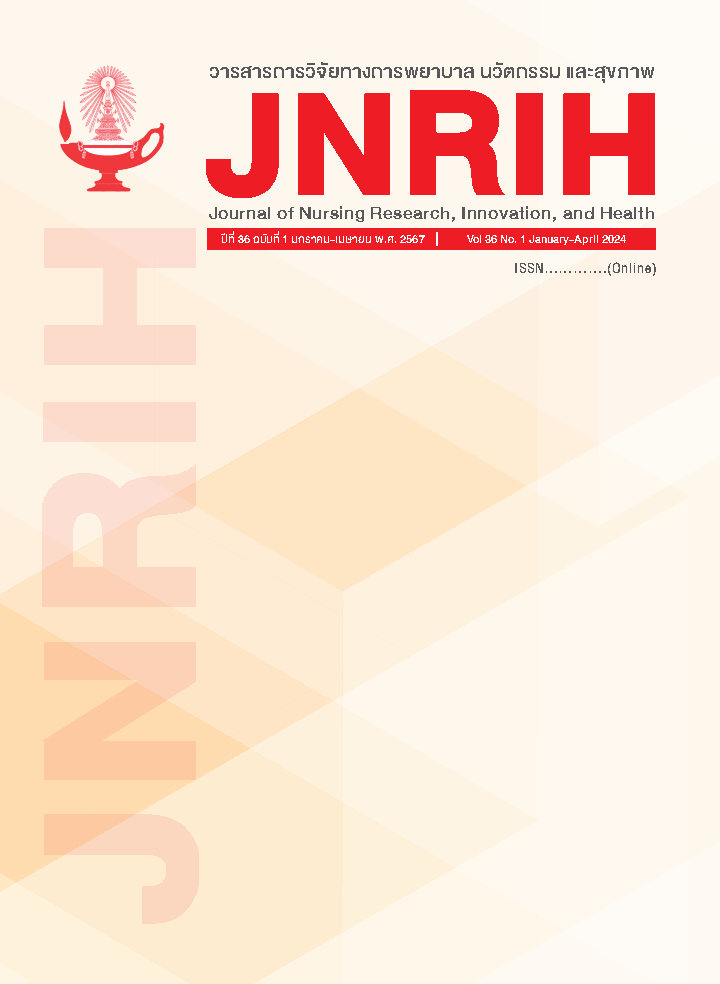ผลของโปรแกรมเสริมสร้างพลังอำนาจของผู้ดูแลร่วมกับการใช้ เว็บแอปพลิเคชัน ต่อทักษะทางสังคมของเด็กออทิสติกวัยก่อนเรียน
คำสำคัญ:
การเสริมสร้างพลังอำนาจ, ผู้ดูแล, เว็บแอปพลิเคชัน, ทักษะทางสังคม, เด็กออทิสติกวัยก่อนเรียนบทคัดย่อ
วัตถุประสงค์: เพื่อศึกษาผลของโปรแกรมเสริมสร้างพลังอำนาจของผู้ดูแลร่วมกับการใช้เว็บแอปพลิเคชันต่อทักษะทางสังคมของเด็กออทิสติกวัยก่อนเรียน
แบบแผนงานวิจัย: การวิจัยกึ่งทดลองแบบศึกษาสองกลุ่มวัดผลก่อนและหลังการทดลอง
วิธีดำเนินการวิจัย: กลุ่มตัวอย่าง คือ เด็กออทิสติกวัยก่อนเรียนอายุ 3-6 ปี และผู้ดูแลที่เข้ามารับบริการในแผนกผู้ป่วยในของสถาบันราชานุกูลซึ่งมีคุณสมบัติตามเกณฑ์โดยได้รับการจับคู่ (Matched pair) แล้วสุ่มเข้ากลุ่มทดลองและกลุ่มควบคุม จำนวน 25 คู่ กลุ่มทดลองได้รับโปรแกรมเสริมสร้างพลังอำนาจของผู้ดูแลร่วมกับการใช้เว็บแอปพลิเคชันเป็นระยะเวลา 4 สัปดาห์ ส่วนกลุ่มควบคุมได้รับการพยาบาลตามปกติ เครื่องมือที่ใช้ในการทดลอง คือ โปรแกรมเสริมสร้างพลังอำนาจของผู้ดูแลร่วมกับการใช้เว็บแอปพลิเคชัน เก็บข้อมูลโดยใช้แบบสังเกตพฤติกรรมด้านทักษะทางสังคมของเด็กออทิสติกวัยก่อนเรียนและแบบประเมินพลังอำนาจของผู้ดูแลเด็กออทิสติก มีค่าดัชนีความตรงตามเนื้อหา เท่ากับ .89 และ .90 ตามลำดับ มีค่าสัมประสิทธิ์แอลฟาครอนบาค เท่ากับ .97 และ .90 ตามลำดับ วิเคราะห์ข้อมูลโดยใช้สถิติทดสอบแบบ paired samples t-test
ผลการวิจัย: คะแนนเฉลี่ยทักษะทางสังคมของเด็กออทิสติกวัยก่อนเรียนของกลุ่มที่ได้รับโปรแกรมเสริมสร้างพลังอำนาจของผู้ดูแลร่วมกับการใช้เว็บแอปพลิเคชันแตกต่างจากก่อนได้รับโปรแกรมอย่างมีนัยสำคัญทางสถิติที่ระดับ .05 และคะแนนเฉลี่ยทักษะทางสังคมของเด็กออทิสติกวัยก่อนเรียนของกลุ่มที่ได้รับโปรแกรมเสริมสร้างพลังอำนาจของผู้ดูแลร่วมกับการใช้เว็บแอปพลิเคชันแตกต่างจากกลุ่มที่ได้รับการพยาบาล ตามปกติ อย่างมีนัยสำคัญทางสถิติที่ระดับ .05
สรุป: การใช้โปรแกรมเสริมสร้างพลังอำนาจของผู้ดูแลร่วมกับการใช้เว็บแอปพลิเคชันทำให้คะแนนเฉลี่ยทักษะทางสังคมของเด็กออทิสติกวัยก่อนเรียนมีความแตกต่างกันซึ่งเป็นไปตามสมมติฐานที่ตั้งไว้
เอกสารอ้างอิง
American Psychiatric Association. Diagnostic and statistical manual of mental disorders (DSM-5®). 5th ed. Washington, D.C.: American Psychiatric Publishing; 2013. 947 p.
March-Miguez I, Montagut-Asunción M, Pastor-Cerezuela G, Fernández-Andrés MI. Intervention in social skills of children with autistic spectrum disorder: A bibliographical review. Psychologist Papers. 2018;39(2):140-9.
Blanc R, Guidotti M, Dansart P, Rambault A, Bonnet-Brilhault F, Malvy J, et al. Early Intervention in Severe Autism: Positive Outcome Using Exchange and Development Therapy. Frontiers in Pediatrics [Internet]. 2021 Dec 15;9: 785762. Available from: https://research-ebsco-com.chula.idm.oclc.org/linkprocessor/plink?id =642cbcd6-dccd-3e2b-9124-fa378bc87978
Quill KA, Brusnahan LLS. Do-watch-listen-say: Social and communication intervention for autism spectrum disorder. 2nd ed. Paul H. Brookes Publishing;2017. 440 p.
Reina S. Factor, Rea Hannah M., Dahiya Angela V., Albright Jordan, Ollendick Thomas H., Laugeson Elizabeth A., et al. An Initial Pilot Study Examining Child Social Skills, Caregiver Styles, and Family Functioning in the PEERS® for Preschoolers Program for Young Autistic Children and their Caregivers. Res Dev Disabil. 2022;121:104152.
El-Azzab SESHI, Ali SMH, Garf FSA, Elsayed DMS. Effectiveness of nursing intervention based on family empowerment model on burden of care and self-efficacy for caregivers of children with autism disorder. Egyptian Journal of Nursing & Health Sciences. 2022;3(1), 409-33.
Gibson CH. The process of empowerment in mothers of chronically ill children. Journal of Advanced Nursing. 1995; 21(6):1201-10.
Junthongsook P, Piaseu N, Kaveevivithchai C. Health Status, Health Promoting Behaviors and Use of Mobile Health Application among Service Users in Private Hospitals. J Nursing Science Chulalongkorn University. 2016;28(3): 147-159.
Ellison KS, Guidry J, Picou P, Adenuga P, Davis TE. Telehealth and autism prior to and in the age of COVID-19: A systematic and critical review of the last decade. Clin Child Fam Psychol Rev. 2021;(24):599-630.
Siriphiboonphol A. Impact of Cooperative play on social skill of autistic early childhood children [thesis]. Bangkok: Srinakharinwirot University; 2009.
Akey TM, Marquis JG, Ross ME. Validation of scores on the psychological empowerment scale: A measure of empowerment for parents of children with disability. Educational and Psychological Measurement, 2000;60 (3):419-38.
Treerapee S. Effects of using empowerment program on burden of psychiatric patients’ caregivers [thesis]. Bangkok: Chulalongkorn University; 2002.
Miller JF. Coping with chronic illness: Overcoming powerlessness. 2nd ed. Philadelphia: Davis;2000. 573 p.
Wakimizu R, Fujioka H, Nishigaki K, Sato I, Iwata N, Matsuzawa A. Development of family empowerment programs for caregivers of children with disabilities at home: Interim report up to “implementation of pretesting”. Int J Nurs Res. 2022;1(1):1-15.
Suprajitno SK. Effect of family empowerment in enhancing the capabilities of children with autism. Belitung Nurs J. 2017;3 (5):533-40.
Toeysri R, Nanthaitaweekul P. The Effect of Empowerment Program on Late Phase Postoperative Recovery Among Post Lumbar Spine Surgery Patients J Nursing Science Chulalongkorn University 2019, 31(3):47-59
Pellecchia M, Beidas RS, Mandell DS, Cannuscio CC, Dunst CJ, Stahmer AC. Parent empowerment and coaching in early intervention: Study protocol for a feasibility studies. Pilot and Feasibility Studies. 2020;6(22):1-12.
Ebrahimi H, Vahidi M, Malek A, Babapour-Kheiroddin J, Abdorrahmani N. The effect of group therapy using the cognitive approach on the empowerment of mothers raising a child with autistic disorder: A randomized-controlled clinical trial. J Res Cli Med. 2019;7(1):23-31.
Punphong S, Jintana Yunibhand J, Suktrakul S. The Effect of Enhancing Family Cargiving Abilty Program on Autistic Symptoms among Autistic Preschoolers. J Nursing Science Chulalongkorn University 2019,31(3):74-86
ดาวน์โหลด
เผยแพร่แล้ว
ฉบับ
ประเภทบทความ
สัญญาอนุญาต
ลิขสิทธิ์ (c) 2024 วารสารพยาบาลศาสตร์ จุฬาลงกรณ์มหาวิทยาลัย

อนุญาตภายใต้เงื่อนไข Creative Commons Attribution-NonCommercial-NoDerivatives 4.0 International License.
##default.contextSettings.thaijo.licenseTerms##


